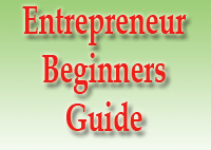Entrepreneur Beginners Guide
“You Have Sales before You Have a Business”
Forget about the business outlook. Be on the outlook for business. —Paul J. Meyer, author, businessman
I had no intention of becoming an entrepreneur. The thought never crossed my mind as a viable and sustainable option in life. In fact, I was conditioned to think and accept that getting arid working a well-paying job was the Holy Grail, the consummate achievement in life. After finding a job, I then could get married, have kids, retire, and die respectfully. Although I learned this restricted way of thinking at home, it was also reinforced in college. Every student worked hard to attain this .Pleasantville-like life. Some days when all students were required to dress alike, I felt like an unoriginal product on an assembly line, being constructed for the corporate world. Not knowing anything else, I welcomed the process and final delivery to corporate America.
That all changed when a website I developed in college became very popular. It was so popular that I received inquiries from companies wanting to advertise. The first was from a dotcom called JobDirect, a web-based job-matching service for college students. JobDirect’s inquiry caught me completely off-guard, because I had no intention of selling ads on .my website. I built the site for fun and to hone my web development skills. I simply wanted it to be the best college portal on the Web, and some would say that it was. In other words, I was passionate about the product, not profits.
JobDirect was eager to advertise on my website and to have everything prepared for the hack-to-school period, so negotiations about price and ad placement went quickly. I was clueless about the whole process, so I searched online for any information to help me appear like I knew what I was doing. I had no idea what to charge the company, how to structure the deal, or who the decision-maker was. I gave JobDirect’s VP of campus relations an arbitrary figure for the cost of the banner ad that made hardly any sense. Surprisingly, he accepted it without hesitation. I probably could have charged more. By summer of my junior year, I had closed a partnership and deal with JobDirect that earned me an $1,800 check. When I received the check via FedEx, I copied it and framed it. I was especially proud. My handsel wouldn’t be the normal wrinkled dollar bill you often see hanging on a business’s wall, but a big check. However, there was just one problem: I couldn’t cash the check.
My website was not officially set tip as a business, so I had a rather large check made out in my website’s name and no way to cash it. However, with that much money at stake, I learned fast what I had to do in order to open a bank account. I researched online the necessary steps to become an official business and followed each one. In fact, I used an online legal service to organize my articles of incorporation and file for my business license. Similarly, I submitted online my application for an Employee Identification Number (FIN) with the IRS. Lastly, I took my articles of incorporation, business license, E1N, and two forms of identification to the local Wachovia and opened my business account. I was in business.
I didn’t know it at the time, but having sales before having a business was proof that I had a promising venture. In fact, considering all the businesses I have started—and there have been many—the most successful ones were those that had sales or significant demand before I even incorporated. There is no better way to start a business than with purchase orders. I had no idea what I was doing, but it was the best situation possible.
As a result, I am weary of those who go into business for the sake of being in business. On the other hand, 1 get excited about those who have a dynamic product or service that serves a salivating market. Which one are you?

